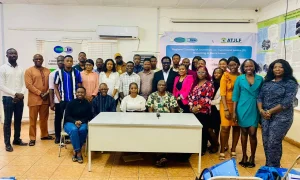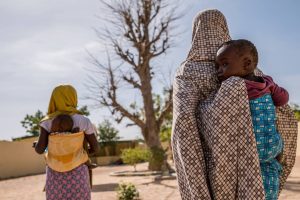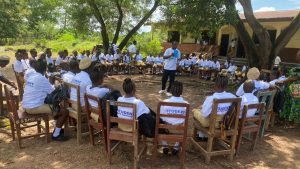Education’s impact on transitional justice stems from its dual role in shaping societal realities. While it has historically been used to reinforce legacies of violence and distrust through indoctrination, it also holds the power to reverse these effects. In post-conflict settings, education drives deradicalization, rehabilitation, and the reconstruction of societal cohesion.
The most immediate connection between education and transitional justice after armed conflict is the need to rebuild schools and restore access. Like in the case of Nigeria’s Northeast, where a 2022 UNESCO report estimated that 20 million children are out-of-school, transitional justice would be incomplete if access for such children is not re-established. However, there is much more to the link between education and transitional justice. How can education be leveraged to transform transitional justice and foster lasting reconciliation, social cohesion, and healing within communities?
It is essential to ensure that school curricula are contextually relevant, with history lessons offering a balanced understanding of past conflicts. This is important because lay knowledge available on conflicts across the continent is biased and subjective especially in the case of asymmetric conflicts. This subjective reading is often at the root of conflict perpetuation. Through education, we can reach a balance and consensus on truth and disseminate that truth in a way that effectively addresses past legacies. For example, ATJLF grantee partner in Cote d’Ivoire – Réseau Action, Justice et Paix (RAJP) is working to advocate for the inclusion of the history of the various politico-military crises in Cote d’Ivoire into the curriculum while also creating an illustration book that clearly shows the sources and drivers of the conflict. Though there is a risk of politicization of the truth, ensuring that independent consultants do this work can forestall such politicization.
We also need to think beyond children and youths to sector specific education on transitional justice. Transitional justice education specific to civil society organizations, religious leaders, the political class and journalists will be important for positive outcomes. For example, political will has been constantly blamed for the failure of transitional justice and is held responsible for the gap between available policies and the extent of practice. Given how comprehensive the African Union Transitional Justice Policy is, a good approach to transitional justice education for the political class would be studying the conflicts in the different countries and educating the political leaders on the AUTJP relevant components for conflicts in their country. – This type of context specific approach to addressing the past through education can make a valuable contribution to peacebuilding.
This will ensure that all citizens – not only children and youths – have the capacity to think critically about the present and the past, so they can foresee and construct a better future.
The Way Forward for Transitional Justice Education in Africa?
- Expanding its outreach agenda to target not only children and youth but also specific sectors.
- Developing robust teaching tools that focus on specific conflicts – analyzing elements of the conflict, the relationship between parties to the conflict, the conflict behaviors displayed, the perception of the situation by the parties to the conflict and recommendations to build post-conflict cohesion.
- Transitional Justice is a field where practice informs theory and vice versa. Establishing a framework that ensures that these two can effectively feed into each other will keep African transitional justice interventions relevant. This approach will include: incorporating lessons from transitional justice processes into educational curricula; increasing access to basic education for out-of-school children through reparations or redress measures among others.
- Adopting a holistic and rigorous approach to peace education. Peace education in post conflict contexts often focuses on promoting values like honesty, integrity, tolerance, justice, unity, and respect to ease communal grievances. While promoting these values are essential, there is also a pressing need to ensure that context relevant modules are centered in peace education. For example, for members of a community in Northeast Nigeria, peace education should not only look like a lesson in values, it should also able be made to relate to the culture, religion and aspirations of the community in question.
Author
-
Pelumi Obisesan is the Programs and Communications Lead at the Africa Transitional Justice Legacy Fund.
View all posts



